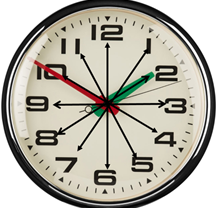- The 24 hours of the day are divided into two; 12 hours in the day [7 a.m. to 6 p.m.] and 12 hours at night [7 p.m. to 6 a.m.]
- 7 a.m. is considered the first hour of the day, hence, saa moja asubuhi and 7 p.m. is the first hour of the night, and therefore saa moja usiku.
Tip 1: When telling time in Kiswahili, you either add six if the number is less than six or subtract six if the number you have is greater than six.
Tip 2: You may find it easier to note that Swahili time is the number on the clock face opposite standard time, e.g. 1 is opposite 7, 2 is opposite 8, etc.
When telling the time, we add a word that describes whether that hour is during the day or night. E.g., Saa moja asubuhi is 7 am.
The periods of the day are:
· Alfajiri [Dawn]
· Asubuhi [Morning]
· Mchana [Daytime/ Afternoon]
· Jioni [Evening]
· Usiku [Night]
· Siku [Day]
· Kutwa [The whole day]
· Kucha [The whole night]
Maneno muhimu [Important words]
· Saa [Hour]
· Dakika [Minutes]
· Sekunde [Seconds]
· Nusu [Half]
· Kamili [Exact]
· Robo [Quarter After]
· Kasoro robo [Quarter To]
· Saa Ngapi [What Time]
How to state time
· Saa moja kamili asubuhi - 7:00 am
· Saa moja na dakika tano jioni- 7:05 pm
· Saa moja na robo asubuhi- 7:15 am
· Saa moja na nusu jioni - 7:30 pm
When it is already past 30minutes, meaning that it is 29 or less minutes to a particular hour, you can use the word kasoro to tell the time.
● Saa tatu kasoro tano asubuhi - 8:55 am
● Saa mbili kasoro robo asubuhi - 7:45 am
● Saa saba kasoro ishirini mchana- 12:40pm
Kuuliza saa [Asking the time]
● Ni saa ngapi? - What is the time?
● Sasa ni saa ngapi? - What is the time now?
Mfano katika mazungumzo [sample conversation]
Ali: Tutaenda shuleni saa ngapi? [What time will we go to school?]
Hassan: Tutaenda saa tatu asubuhi. [We will go at 9am.]
Ali: Halafu tutarudi nyumbani saa ngapi? [Then what time will we go back home?]
Hassan: Tutarudi saa kumi kasoro robo. [We will go back at 3:45 pm.]
Ali: Sawa, asante. [Okay, thanks.]
Exercise 1
What time does the day start?
a. 6am
b. 7am
c. 1am
d. 1pm
What is 7am in Kiswahili?
a. Saa moja jioni
b. Saa Saba asubuhi
c. Saa moja asubuhi
d. Saa Moja usiku
What is being said: Jioni
a. Morning
b. Night
c. Evening
d. Day
What is 6pm in Kiswahili?
a. Saa kumi na moja jioni
b. Saa kumi na mbili jioni
c. Saa kumi na mbili asubuhi
d. Saa sita jioni
What is being said: Usiku
a. Night
b. Morning
c. Day
d. Evening
What is being said: Saa mbili asubuhi
a. 2am
b. 8am
c. 2pm
d. 8 pm
What is 5am in Kiswahili?
a. Saa kumi na moja subuhi
b. Saa kumi na mbili asubuhi
c. Saa tano asubuhi
d. Saa tano jioni
How do you say 'am' in Kiswahili?
a. Jioni
b. Usiku
c. Asubuhi
d. Mchana
How do you say 'early evening pm' in Kiswahili?
a. Jioni
b. Usiku
c. Asubuhi
d. Mchana
What is 'midnight' in Kiswahili?
a. saa kumi na mbili usiku
b. saa sita mchana
c. saa sita usiku
d saa tisa usiku
Exercise 2: Translate these times into Swahili
1. 9:00 a.m.
2. 10:00 p.m.
3. 7:00 p.m.
4. 8:00 p.m.
5. 4:00 a.m.
6. 10:45 a.m.
7. 1:11 p.m.
8. 9:30 p.m.
9. 11:49 a.m.
10. 8:05 p.m.
11. 6:12 p.m.
12. 4:01 a.m.
13. 7:40 a.m.
14. 12:58 p.m.
15. 5:35 a.m.
